外研版八年级英语上Module6_Unit1.ppt
- 格式:ppt
- 大小:3.02 MB
- 文档页数:35
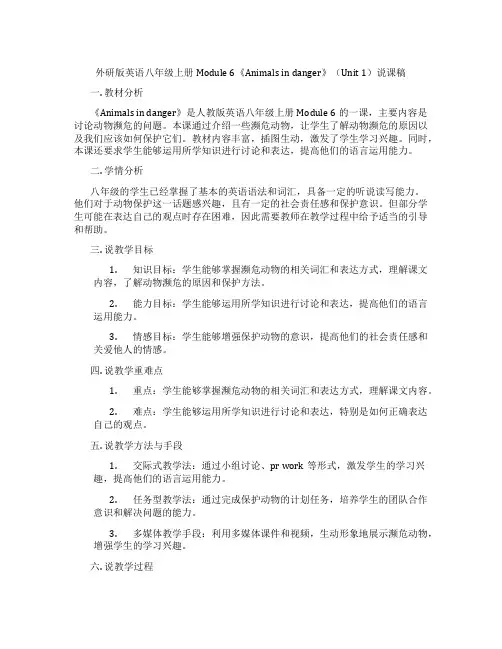
外研版英语八年级上册Module 6《Animals in danger》(Unit 1)说课稿一. 教材分析《Animals in danger》是人教版英语八年级上册Module 6的一课,主要内容是讨论动物濒危的问题。
本课通过介绍一些濒危动物,让学生了解动物濒危的原因以及我们应该如何保护它们。
教材内容丰富,插图生动,激发了学生学习兴趣。
同时,本课还要求学生能够运用所学知识进行讨论和表达,提高他们的语言运用能力。
二. 学情分析八年级的学生已经掌握了基本的英语语法和词汇,具备一定的听说读写能力。
他们对于动物保护这一话题感兴趣,且有一定的社会责任感和保护意识。
但部分学生可能在表达自己的观点时存在困难,因此需要教师在教学过程中给予适当的引导和帮助。
三. 说教学目标1.知识目标:学生能够掌握濒危动物的相关词汇和表达方式,理解课文内容,了解动物濒危的原因和保护方法。
2.能力目标:学生能够运用所学知识进行讨论和表达,提高他们的语言运用能力。
3.情感目标:学生能够增强保护动物的意识,提高他们的社会责任感和关爱他人的情感。
四. 说教学重难点1.重点:学生能够掌握濒危动物的相关词汇和表达方式,理解课文内容。
2.难点:学生能够运用所学知识进行讨论和表达,特别是如何正确表达自己的观点。
五. 说教学方法与手段1.交际式教学法:通过小组讨论、pr work等形式,激发学生的学习兴趣,提高他们的语言运用能力。
2.任务型教学法:通过完成保护动物的计划任务,培养学生的团队合作意识和解决问题的能力。
3.多媒体教学手段:利用多媒体课件和视频,生动形象地展示濒危动物,增强学生的学习兴趣。
六. 说教学过程1.导入:教师通过提问方式引导学生谈论他们喜欢的动物,引出本课主题。
2.呈现:教师通过展示濒危动物的图片和视频,呈现本课的主要内容。
3.讲解:教师讲解课文内容,帮助学生理解动物濒危的原因和保护方法。
4.实践:学生进行小组讨论,讨论如何保护动物,并完成保护动物的计划任务。
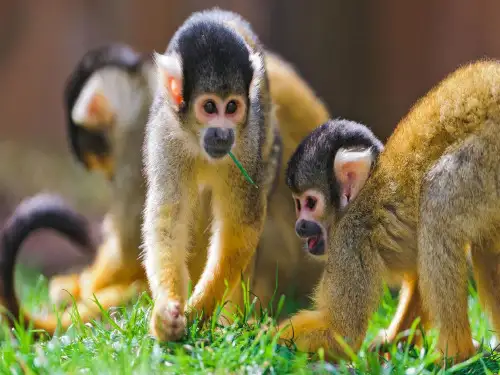
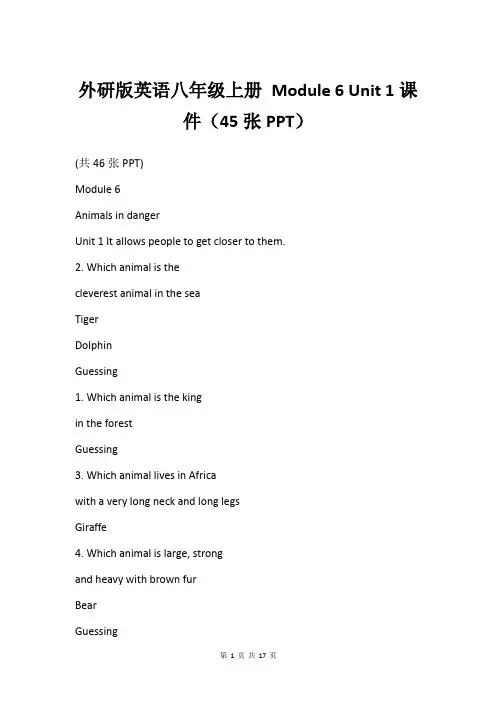
外研版英语八年级上册Module 6 Unit 1课件(45张PPT)(共46张PPT)Module 6Animals in dangerUnit 1 It allows people to get closer to them.2. Which animal is thecleverest animal in the seaTigerDolphinGuessing1. Which animal is the kingin the forestGuessing3. Which animal lives in Africawith a very long neck and long legsGiraffe4. Which animal is large, strongand heavy with brown furBearGuessing5. Which animal is large with big ears and a very long nose6. Which animal looks very cute and lives only in China ElephantPandaFree talkWhy the animalsare in dangerPollutionHuntingKillingNo living placesTaking away the land and forests Humans and animalsare friends.We should protectthem and live in peace.Words and expressionssnakeneckthindangerin dangerat lastinterestedn. 蛇n. 颈;脖子adj. 薄的;细长的n. 危险;危害处于危险中终于;最后adj. 关心的;感兴趣的Words and expressions allowthink ofprotectwildgrowtake awayv. 允许;准许想到;想出v. 保护;保卫adj. 野生的n. 野生环境v. (逐渐)变得;生长夺去;拿走Words and expressionsenoughpeacein peacenoticelook afterraiseadj. 足够的;充分的n. 和平;太平和平地;平静地n. 布告;告示照顾;照管v. 筹集(钱款);抚养;养育1Look at the pictures and do the quiz.Use the words in the box.1. I am tall and I have a long neck.bear elephant giraffe lion snake giraffe2. I am the tiger’s cousin.lion3. I am long and thin.snake4. I am big and I have a very long nose.elephant5. I am brown and I live in the forest.bear1Look at the pictures and do the quiz.Use the words in the box.bear elephant giraffe lion snake2Listen and answer the questions.1. What’s this week’s Animal World about2. What animals are in dangerIt’s about snakes.Pandas, lions, elephants and bears arein danger.3Listen and read.Lingling and Betty are talking about animals in danger.Listen and read.Finish the following tasks.3Listen and read.(Lingling and Betty are leaving the zoo.)Lingling: Did you like the zooBetty: Yes! I saw the pandas at last! But I am more interested to see the pandas in the Wolong Panda Reserve, because it allows people to get closer to them.Lingling: It’s sad to think of pandas and other animals in danger. Betty: We need to protect them better.Lingling: Yes. Many wild animals don’t have a safe place to live, because villages and farms are growing bigger and are taking away their land and forests.Listen and read.Betty: Also, often there isn’t enough clean water. I think we all need to help animals live in peace. Look, there’s a notice. Lingling: It says, “Help! We want to save animals in danger, andwe need your help.”Betty: But what can we doLingling: It says, “Your money pays to look after the animals.”That means we can give money to help protect the animals.Betty: Maybe we can raise some money at school. Let’s find outwhat else we can do to save as many animals as possible.3Now complete the table.Why many animals are in danger What we can do to help①Many animals don’t have a safe place to live, because villages and farms are growing bigger and are taking away their land and forests.②There isn’t enough clean water.①Raise some money to look after animals.②Find out what else we can do to save as many animals as possible. Why many animals are in danger What we can do to help③People kill them for food, for clothes, for money or for medicine.④Many animals don’t have enough food to eat.③Stop killing them and return them to nature.④Support a charity for animals.⑤Don’t buy products made with anything from animals in danger.⑥Plant more trees and build more nature reserves.Work in pairs. Discuss and add moreinformation to the table.Now answer the questions.1. Did Betty see the pandas at the zoo2. Is Betty interested in the pandasYes, she did.Yes, she is.Now answer the questions.3. What does Lingling think of the pandas andother animals in danger4. Why do many animals not have a safe placeto liveShe feels sad to think of them in danger.Because villagers and farms are growing biggerand are taking away their land and forests.Everyday English... at last!Help!What can we do4Complete the passage with the wordsand expression in the box.allows danger enough in peace protect raise Many wild animals, such as pandas, are in (1)________. We need to (2)________ them! Often there is not (3)________ land or forests, so the animals do not have a safe place to live.The Wolong Panda Reserve (4)________ people to get closer to pandas.And the pandas live (5)________ there. We can help (6)________ money to protect pandas and other wild animals.allowsin peaceraisedangerprotectenough5Listen and mark when the speaker pauses.1. It allows people to get closer to them.2. We want to save animals in danger, and we need your help.3. We can give money to help protect the animals.Now listen again and repeat.6Work in pairs. Ask and answer the questions.1. Why do you visit the zoo2. Do you think animals are happy in the zoo3. Where do most animals live4. What can we do to help the animals7Talk with your partner about what we can do to protect animals indanger.We need to…to protect…To protect…we should…We need to make someposters and tell peopleabout animals in dangerto protect the animals.To protect the animals,we should stop peoplefrom killing them andcutting down the forest.Now share your ideas with the rest of the class.What do they thinkFor example:1. What animals are in dangerin danger表示“处于危险中”,其反义短语为out of danger“脱离危险”。
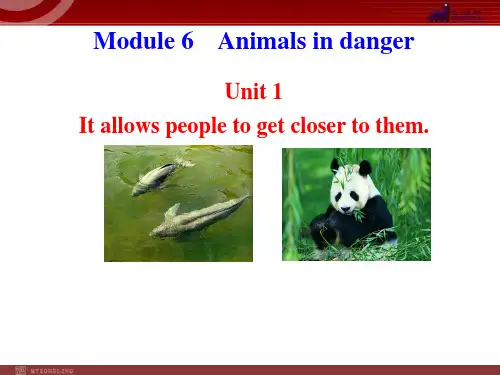
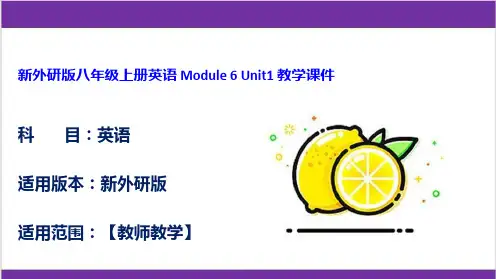
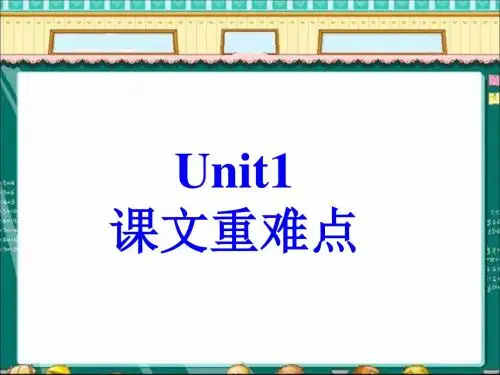
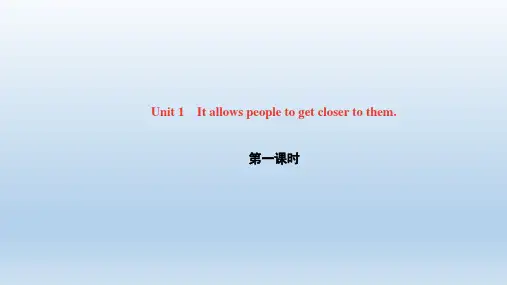
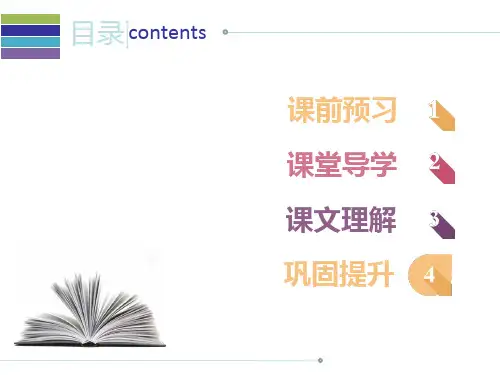
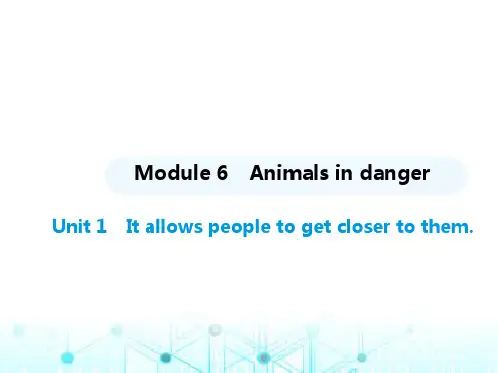
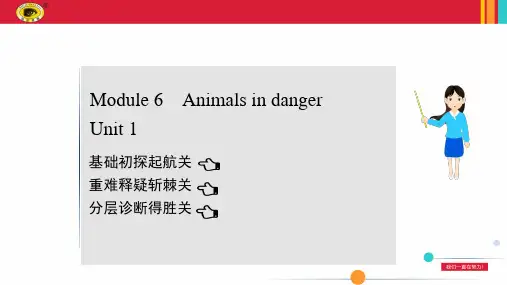
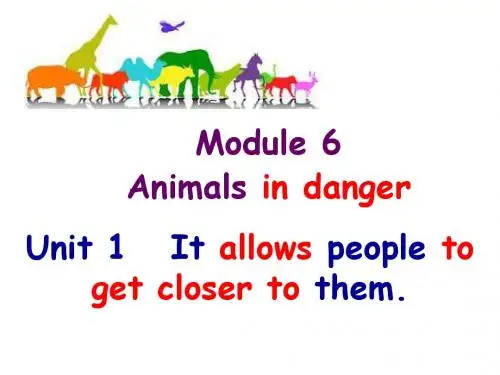
外研版八年级英语上册,Module 6 Unit 1词汇表1、snake [sneik] n. 蛇2、neck [nek] n. 脖子;脖子3、thin [θin] adj. 细长的;瘦的4、danger [ deindʒə] n. 危险;危害5、in danger 处于危险中6、at last 终于;最后7、interested [ intristid] adj. 关心的,感兴趣的8、allow [ə lau] vt. 允许;准许9、think of 想到,想出10、protect [prəu tekt] vt. 保护,防卫11、wild [waild] adj. 野生的;n.野生环境12、grow [ɡrəu] v. grew [ɡru:] (逐渐)变得;生长13、take away 夺去;拿走14、enough [i nʌf] adj. 充分的;足够的15、peace [pi:s] n. 和平;太平16、in peace 和平地;平静地17、notice [ nəutis] n. 告示,布告18、look after 照顾;照看19、raise [reiz] vt. 抚养;筹集(钱款);养育;20、research [ri sə:tʃ] n. 研究;探讨21、baby [ beibi] n. 婴儿,婴孩22、situation [,sitju eiʃən] n. 情况;形势23、scientist [ saiəntist] n. 科学家24、produce [prə dju:s] vt. 生育;繁殖25、southwest [,sauθ west] n. 西南 adj. 西南的;朝西南的26、in order to 为了27、government [ ɡʌvənmənt] n. 政府28、set [set] v. 设置;设定29、set up 开办;设立;创办;建立30、nature [ neitʃə] n. 大自然;自然界31、nature park 自然公园32、develop [di veləp] v. 研制;制定33、feed [fi:d] vt. (fed [fed])喂养;饲养34、symbol [ simbəl] n. 象征;标志Module 6 课文视频课文翻译Unit 1 那儿允许人们接近他们(玲玲和贝蒂正要离开动物园)玲玲:你喜欢这个动物园吗?贝蒂:我喜欢它!我终于见到熊猫了!但是我更感兴趣的是在卧龙熊猫保护区看熊猫,因为这可以让人们更接近它们。
Module6 Animals in dangerUnit1 It allows people to get closer to them.1. animals in danger= endanger ed animals濒危动物endanger vt.使处于危险之中endanger ed adj.处于危险之中的(过去分词变来的形容词)in danger处于危险之中out of danger挣脱危险danger-safety n. dangerous-safe adj.2. allow sb. to do sth.赞同、赞同某人做某事Some snakes allow people to touch them.be allowed to do sth.被赞同做某事We are not allowed to eat junk food ( 垃圾食品 ) in the classroom.agree to do sth.dis agree vi.不一样意agree with sb.agree ment n.3. get close(r) to4. sb. be interested to do sth.= It be interesting for sb. to do sth. (it是形式主语,后边的动词不定式是真切的主语)Sb. be interested in (doing) sth.take/ have/ show interest in (doing) sth.对感兴趣He is reading the latest novel by Mo Yan withgreat interest.(介词短语做状语修饰动词reading )他饶有兴趣地阅读莫言的最新小说。
5. think ofHe is sad to think of his dead pet.=It is sad (for him) to think of his dead pet.What do you think of the nature park?=How you do you like ?5.We need to protect animals.sb. need to do sth.sb. need sth./sb.sth. need doing= sth. need to bedone The floor needs sweeping.= The floor needs to be swept.7. wild animals adj.in the wild n. in (the) nature在自然界It ’s natur al for everyone to make miskates.8. grow big /small/ tall/ oldeg: You are growing taller day by day while I’m growing older year by year.你们在一每日地长高而我在一年一年地变老。